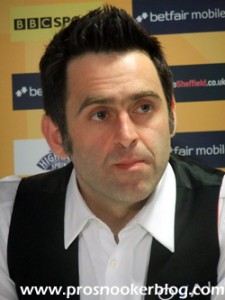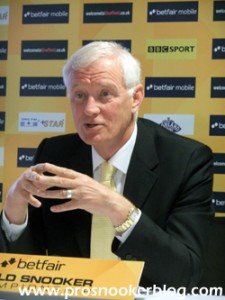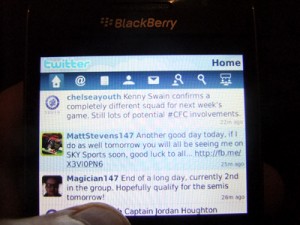
The growth of social media in recent years has no doubt been a positive development for snooker, allowing fans to follow the sport and get closer to its star attractions than ever before. In light of certain ‘tweets’ yesterday and in recent weeks however, the other side of the coin is that of the potential damage that can be caused to the sport and what World Snooker need to do in order to help the players…
Like it or loathe it, there can be little doubt as to the power of social media in these times, not just in snooker, but in the wider world as well. Personally while I am no fan of the hugely popular Facebook, I have enjoyed interacting with people on Twitter over the past few years and as much as anything, find it to be the easiest way to follow breaking news and stories on my personal interests, not least snooker.
For many, perhaps the biggest appeal of Twitter in particular is that with many of the world’s top players using the site, it gives us mere mortals an opportunity to interact with them, to ask them questions and to gain some insight into what they are like away from the baize and the glare of the TV cameras.
Of course, all of the players and snooker characters use it differently. Neil Robertson tends to talk about Chelsea, Neal Foulds about cricket and Mark Williams about pretty much anything, and it is this which makes it so interesting.

For all of the positives however, it must also be said that the growth of Twitter has also coincided with the growth in fines issued by World Snooker, following all sorts of tweets over the past few years by players which have been deemed to be unacceptable.
Most notably the likes of Mark Allen and Mark Williams have found themselves making donations to World Snooker’s chosen charities by way of fines for comments on Twitter, while Ronnie O’Sullivan of course hit the headlines and was forced to backtrack recently with his comments following the issue of Stephen Lee’s 12-year ban.
Just a couple of weeks on from that, it is hard to imagine that Ronnie will escape censure for further tweets yesterday which can best be described as lewd and which at some time this morning have been deleted from his Twitter feed.
Of course to many, the tweets from all of these and the rest of the players will not have caused any offence and go some way to counter the tired accusation thrown at snooker that there are no characters in the game. It is good to see the players being themselves and breaking free from the shackles of PR, which play a part in any sport these days.
Personally I can only recall one particular exchange on Twitter that I would say ‘offended’ me in any way, none of which involved the players already mentioned here and I do enjoy the banter and to see the players say what they think.

So what is the problem?
Simply put, the problem is that with Barry Hearn, Jason Ferguson and others trying to develop the sport globally and to demonstrate to potential sponsors and broadcasters that this is a professional sport to be taken seriously, there are certain lines that should not be crossed. With initiatives such as the ‘snooker into schools’ programme, it is important that these are not undermined by the comments of the most high profile personalities in the game.
While the constant comparisons of snooker to tennis from people who do not actually understand tennis are increasingly beginning to grate, it is hard to imagine the likes of Roger Federer or Rafael Nadal tweeting images such as that by Ronnie yesterday, or using the sort of language that several snooker players are using on Twitter on a regular basis. Similarly you would not expect to see the world’s leading golfers to do the game. It would not happen and that is the standard and the image that snooker must aspire to.
As much as it is good to see what the players are really like, I have had some fans message me with regard to certain players, expressing surprise and disappointment as to how they come across on Twitter, perhaps shattering certain illusions that we are provided with on the television.

That said, I don’t think that the players are entirely to blame. While newcomers to the tour (who from what I have seen do tend to tweet sensibly), are these days provided with media training during their first season, those who have been around a bit longer will not necessarily have had the benefit of that.
Whether World Snooker have issued clear and proper guidance as to how the players should conduct themselves on websites such as Twitter is unclear, but if not, then I would be surprised if this were not to happen sooner rather than later and for this to be backed up with clear sanctions for those who do not follow it.
The simplest advice that I would have to anyone, be it snooker players or anyone else with regard to Twitter is to think before you tweet.
Clearly there are some instances (and we have all done it), where it is clear that someone has tweeted something that has come into their head without thinking through the consequences and while revealing, this must also be weighed against the responsibility that comes with being a leading professional sportsman and an ambassador to snooker.
Whether it is criticising table conditions, swearing, arguing with other players or tweeting things totally unrelated to snooker, people must remember that everyone can see their comments and consider whether certain comments would be best made in private, or to the governing body directly.
No doubt we will see more ill-advised tweets between now and the end of the season, but I sense that things will come to a head sooner rather than later…
